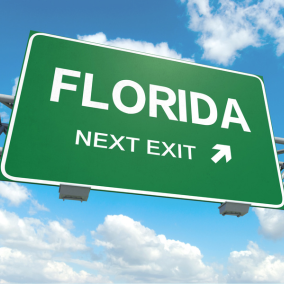As seasoned real estate agents navigating the tropical landscapes of Florida, we understand that the journey to finding your dream home can be both thrilling and overwhelming. Fear not, intrepid homebuyers, for this blog post is your compass through the frequently charted waters of homebuying in the Sunshine State.
In this comprehensive guide, we’ll answer FAQs about 5 topics and delve into the heart of the matter – answering your most burning questions about lenders, as-is contracts, the indispensable role of title agencies in closings, the mysteries of flood insurance, and the intricacies of deed restrictions.
Whether you’re a first-time homebuyer with wide-eyed excitement or a seasoned resident seeking a new Floridian abode, consider this your backstage pass to a smoother, more informed homebuying journey. So, grab your sunglasses, envision that waterfront sunset view, and let’s embark on a Floridian adventure where your dream home awaits!
We’ll start with lenders because that’s really where your home-buying journey starts (unless you’ll be paying cash). Yes, you should contact an agent first, and well before you think you’re ready to start the process (it’s never too early to speak with an agent, and the earlier the better), but you can’t move forward with your search until you know your budget.
Which brings us to FAQ 1…
- Why do I need to speak to a lender right away, and why do you recommend a local lender?
We don’t want to sound rude, but the truth is that showing you homes that might not fit into your budget is a waste of your time, our time, and the seller’s time. Also, many sellers request that any buyers entering their home be pre-approved or have proof of funds (which is a letter from a financial institution that proves you have liquid funds available to pay for a home). Finally, you’ll need to submit one of these two letters when you make an offer.
We have buyers tell us all the time what they think their pre-approval number is, and most of the time they’re off, so it’s important to speak to a lender who can take into account the money you have coming in, the money you have saved, and your debt, and how that will impact your purchasing power while also factoring in your down payment, monthly note, taxes, and insurance. A good lender will also speak to you about your financial plans and goals and help you figure out how to create a budget for housing that doesn’t leave you house poor.
We prefer that our buyers work with a local lender in the Tampa Bay area. Lending guidelines are different down here compared to other states, as well as for condos as opposed to single family homes. You don’t want to get three weeks into the process only to discover your lender in New York had no idea to ask about whether or not the condo community qualifies for a lower downpayment, learning it doesn’t, and realizing you don’t have the money to make up the difference, which means you’re not getting the property.
You also want a lender you can speak to directly, not a bank that is only open during business hours or a call center where you don’t have a designated person to speak to.

- What is the As-Is contract?
In a nutshell, most contracts used in the Tampa Bay area are As-Is. This means you have the right to inspect to know what you’re buying, but you may ultimately end up buying the house as-is as long as you and the seller agree to all terms. You can ask for repairs or credits during the inspection period, but the Seller can agree, deny, negotiate, or ignore your request. At the same time, you have the right to walk away during the inspection for any reason, not only because of something that came up during the inspection.
- I’ve heard I don’t need a real estate attorney as a buyer or seller in Florida. How does that work?
This is true; neither party is required by Florida law to hire an attorney to manage the transaction. The short answer is that working with an attorney-owned and operated title company will help you safely navigate through the intricacies of the process.
One of the primary responsibilities of a title agency is to conduct a thorough title search on the property being bought or sold, which involves examining public records to trace the history of ownership and uncover any outstanding liens, judgments, or other issues that could affect the property’s title.
The title agency typically offers title insurance to protect both the buyer and the lender against any unforeseen defects in the title that may arise after the transaction is completed.
In many real estate transactions, the title agency also acts as the escrow agent, holding funds and documents in escrow until all conditions of the sale have been met.
Finally, the title agency coordinates the closing process, which involves gathering all necessary documents, facilitating the signing of paperwork, and disbursing funds to the appropriate parties. They also ensure that all legal requirements are met for the transfer of ownership to be completed successfully.

- I want to live in Florida, but I’m worried about hurricanes. What do I need to know about storms and flood insurance?
Hurricanes can be scary. We’ve been full-time Florida residents since 2007 and never had to evacuate because of a storm until Irma came along in 2017. Since then, we’ve had Ian in 2022 and Idalia in 2023. Though we were lucky enough to avoid any damage, others were not, and seeing the devastation is scary and heartbreaking.
Unfortunately, serious weather events are a part of life in almost every city in the U.S., and at least with hurricanes you have ample time and warning to prepare.
Before storm season, there will be a hurricane preparedness week. Take advantage of sales and tax breaks to stock up on items you’d need during a storm, like battery-operated lanterns, a weather radio, extra batteries, coolers, generators, cell phone chargers, etc. Stock up on food and supplies for your hurricane kit before a storm hits, and whatever you don’t use during storm season can always be donated. The local meteorologists will provide you with excellent checklists and plans.
The most important point is that if you live in an evacuation zone, get out. Don’t try to predict the future. You don’t know exactly where the storm will go, and you don’t know how bad it will be. We hear people say, “I don’t need to leave. I live on the fourth floor of my condo.” Yes, your home won’t be flooded in 10-feet of storm surge, but what are you going to do after the storm? Because you ain’t leaving your house.
As for flood insurance, many areas in Tampa Bay are located in flood zones. If you are getting a loan, you will be required to have flood insurance, and condos located in flood zones will often have higher association fees because of the association’s master flood policy. In either case, flood insurance may affect your budget. If you’re a cash buyer making a purchase in a flood zone, you won’t be required to purchase flood insurance, but you’d be foolish not to get it.
- I see a lot of signs for deed restricted communities in Florida. What does that mean?
Deed restrictions, also referred to as covenants, are legal limitations imposed on a property through the deed by the property developer or a homeowners’ association (HOA). These restrictions are designed to regulate and control certain aspects of land use and property development to maintain a certain standard and protect the interests of the community or neighborhood.
Examples of deed restrictions include restrictions on property use, architectural guidelines, maintenance requirements, and rules regarding external structures like fences or outbuildings. Some deed restrictions may also address issues such as landscaping, noise levels, and the keeping of pets.
HOAs have the authority to enforce the deed restrictions, collect fees from homeowners, and take legal action against those who violate the restrictions.
The restrictions can be modified or amended, but this usually requires the consent of a certain percentage of property owners within the community or approval from the HOA.
On the one hand, deed restrictions aim to maintain a certain quality of life, preserve property values, and create a uniform and cohesive appearance within a community. However, some property owners may find them restrictive, as they limit the way in which a property can be used or modified. For instance, a deed restriction might prevent you from running a business out of your home, parking a commercial truck in your driveway, or hanging any flags or banners except those approved by the HOA.
It’s important for property owners to be aware of and comply with deed restrictions to avoid potential legal issues and conflicts with the homeowners’ association or other property owners in the community.
The Sunshine State is more than just a location; it’s a lifestyle. And your homebuying journey is not just a transaction; it’s the beginning of a chapter filled with memories, laughter, and the unmistakable joy of calling Florida home.
With the mysteries of lenders, the intricacies of as-is contracts, the pivotal role of title agencies, the necessity of flood insurance, and deed restrictions demystified, you’re now ready to embark on your Floridian adventure.
